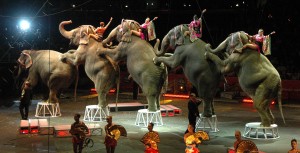Ringling Brothers to End Its Elephant Show
March 10, 2015
Last week, Ringling Bros. and Barnum & Bailey Circus announced they will retire their performing elephants by 2018. The animals will then live at the company’s Center for Elephant Conservation in central Florida. The 200-acre (80-hectare) center was established in 1995 and is a home for elephants to grow up and grow old.
After 145 years of featuring the animals in its “Greatest Show on Earth,” the company announced that it had taken this “unprecedented” decision to be able to focus its efforts on elephant conservation programs in North America and Sri Lanka. Critics noted the announcement came after years of scrutiny and criticism concerning the organization’s training and treatment of elephants while on tour, which can include traveling to over 100 cities in a year. Several cities banned shows with live elephants, which made Ringling Brothers tour schedule more complex.

Elephants performing at a Ringling Brothers show. Animal-rights activists have objected to the way in which elephants are housed and trained when traveling with the circus. Credit: © Shutterstock
The Asian elephant (Elephas maximas), the species of elephant featured in Ringling Brothers shows, is one of the largest animals on Earth, standing from 9 to 10 ½ feet (2.7 to 3.2 meters) tall at the shoulder and weighing up to 8,000 pounds (3,600 kilograms). Elephants are extremely strong, highly intelligent, and socially sensitive. People have tamed and trained them for thousands of years. Trained circus elephants can stand on their heads, lie down and roll over, dance, and perform many other tricks. According to Ringling Brothers circus, elephants can respond to some 60 verbal commands.
Hopefully, Ringling Brothers conservation center can help to increase the number of Asian elephants. There are only about 40,000 to 50,000 of this endangered species remaining in the wild. Since the 1860′s, the animal’s population has been halved. Threats to elephants’ survival include habitat loss, conflict with humans, and illegal wildlife trade, especially of ivory from elephant tusks. Wildlife experts agree that elephants are in great danger and need human protection to survive. A spokesman for Ringling Bros. and Barnum & Bailey stated of their Center for Elephant Conservation, “No other institution has done or is doing more to save this species from extinction.”
Other World Book articles:


